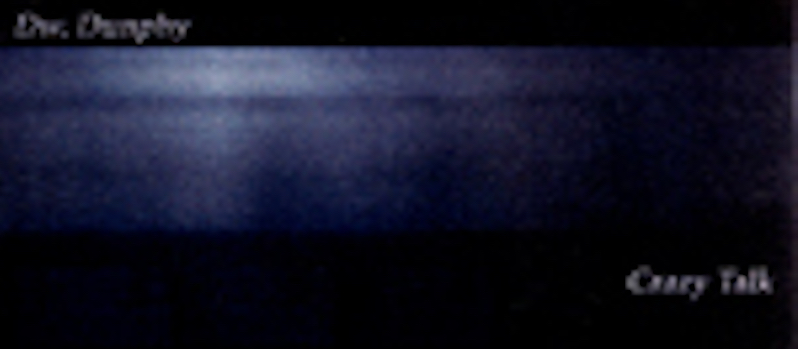Two-thirds of the way into “Secret Language,” Dw. Dunphy’s Crazy Talk EP goes from interesting to incredible. The song, the fourth on the five-track “promotional” offering, starts modestly enough: some tape clips and snippets of indistinguishable voices dart from speaker to speaker and pair with the hesitant moan of a bassy synthesizer. It slowly grows and unfurls from there — first with a carefully placed hip-hop backbeat and, later, with repeating patterns and figures on a variety of keyboards.
And then it happens. Five minutes in, the layers of keyboards and synth washes and constructed sound give way just slightly to Dunphy’s voice, subtle and unassuming, mixed a half-step below almost everything that surrounds it. He doesn’t sing anything really — he just half-hums a repeated refrain of “Bum, bum, bum” — but the moment has a startling impact that only deepens when a second vocal is thrown into the closing minutes, a wail that’s clearly struggling to break away from the synthetic sounds that seek to engulf it.
Though Dunphy’s experimented with a number of genres in recent years, Crazy Talk is a bit of a departure for him, a collection that ditches the singer/songwriter genre of past records for an almost entirely instrumental terrain of synthscapes. It’s a clear- and single-minded outing and, if the forthcoming Gibberish follows suit, an indication that Dunphy is entering a new phase in his songwriting. (For the sake of full disclosure, it should be stated that I have been a friend and musical collaborator with Dunphy, on and off, for the better part of 10 years. Whether this indicates critical bias or merely a wealth of context is left for the reader to decide.)
Crazy Talk is, according to its brief liner notes, merely a primer for Gibberish, but Dunphy injects it with all the vitality and care you’d expect from a lengthier outing. The record begins with “E.T.A.” (note the subtle invitation/invocation), which moves between movie-soundtrack synth refrains and a catchy groove accented by reggae-inspired percussion (note the hi-hat hits falling on the guitar upstrokes) and a dense smattering of bottom-heavy guitar distortion (note the keyboard notes, pedal effects and all, that add to the crunch). While each of the EP’s five tracks bleed into each other with well-executed transitions and samples, the segue between “E.T.A.” and the swelling “Brainclouds” works best. A couple of movie clips scattered through the track (one, it seems, is from Philadelphia) are slightly disposable, but what really grabs the attention is the 80s-consciousness of the keyboards. Elsewhere, Dunphy tries to shift the focus without rewriting the thesis, offering the hushed church-choir intro of “In the Arms of Mother Night” and the glassy acoustic guitars and reverbed, wordless backing vocals of the EP-closing “She is Not, You Know.”
Plenty of independent-minded musicians have mined the history of 80s pop, some driven by a genuine devotion to the source material and some, instead, with a sense of how unearthing that material presents its own set of commentaries and contexts. Dunphy might find himself at home in both camps. But what he’s demonstrated on discs like the song cycle Proud Sons of the Suburbs or the vastly overlooked The Look and Social Discomfort is that he’s not afraid of the synthetic sounds that much of that generation of artists adopted as part of its modus operandi. Quite the opposite, Dunphy seems to do his best work when confronting this head-on, trying to find the organic and the human somewhere underneath the layers of machinery and computer-assisted noise. It’s a noble fight, and Crazy Talk, even in its passing moments, is another great front in that battle. – Delusions of Adequacy, Feb. 10, 2005



